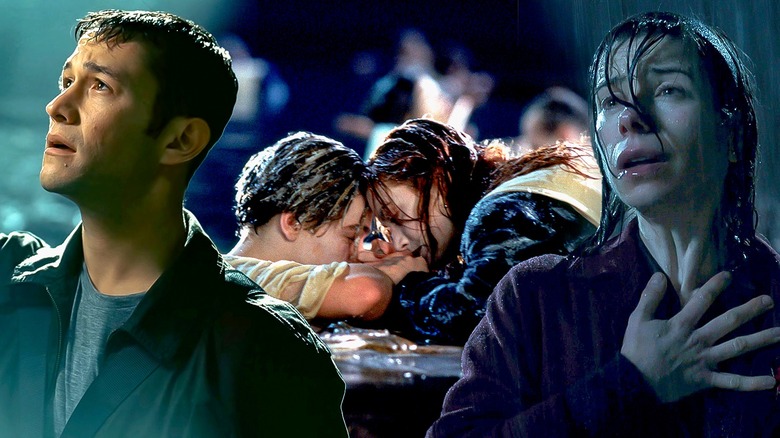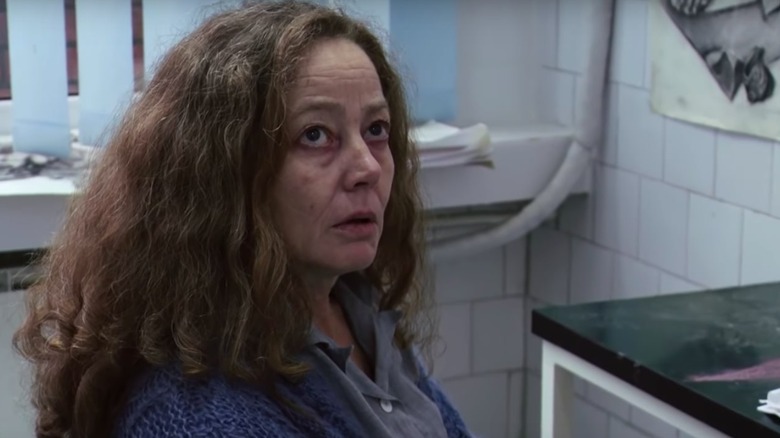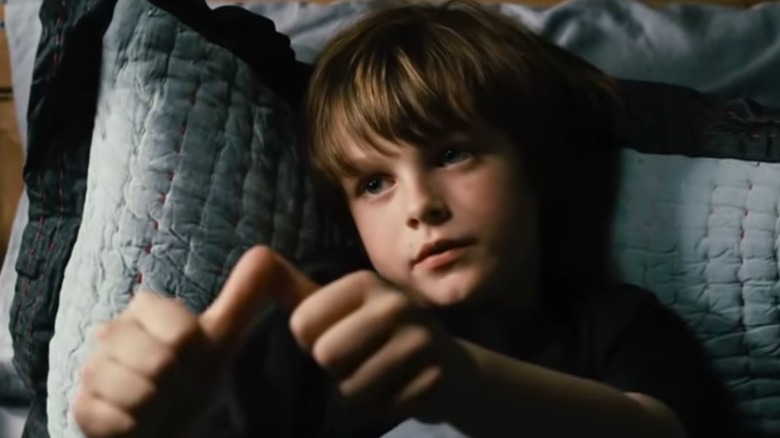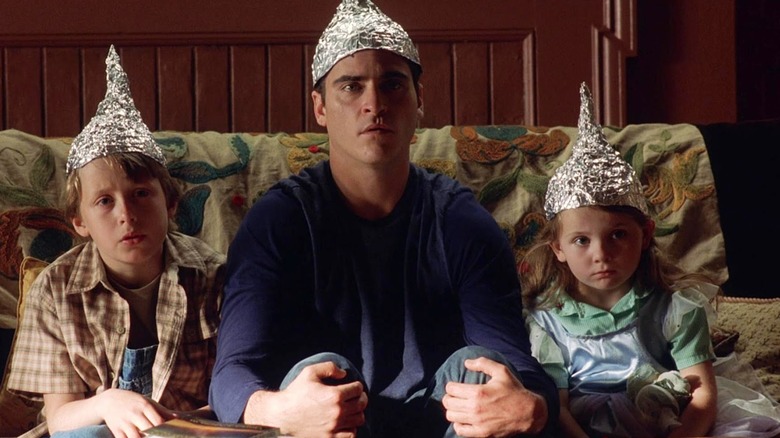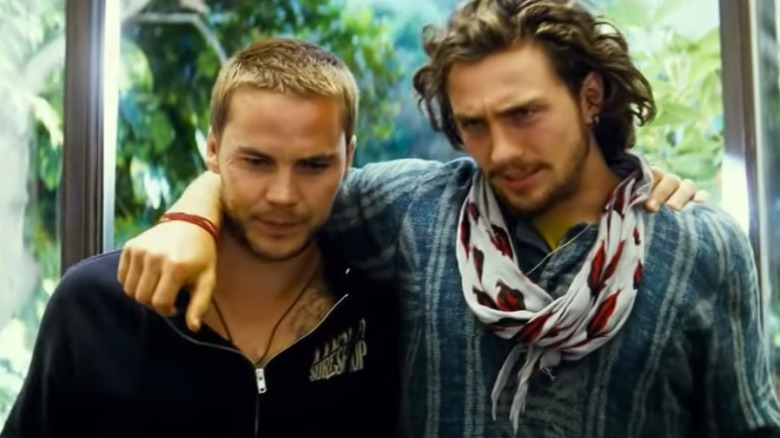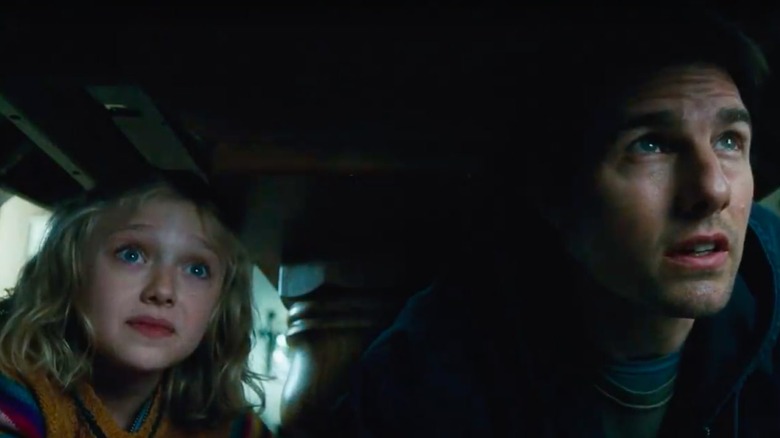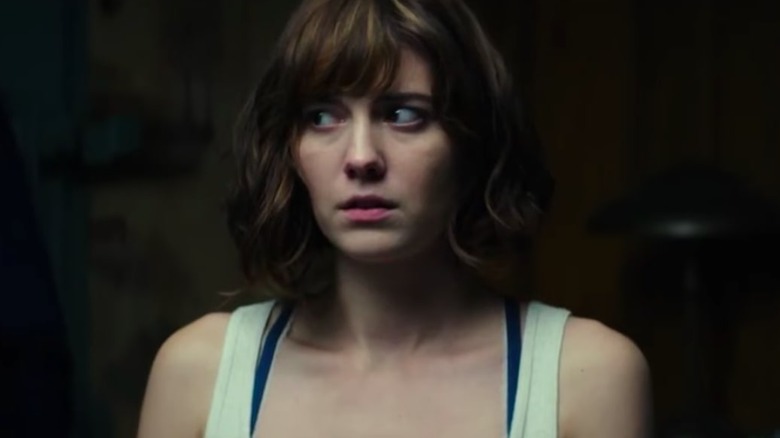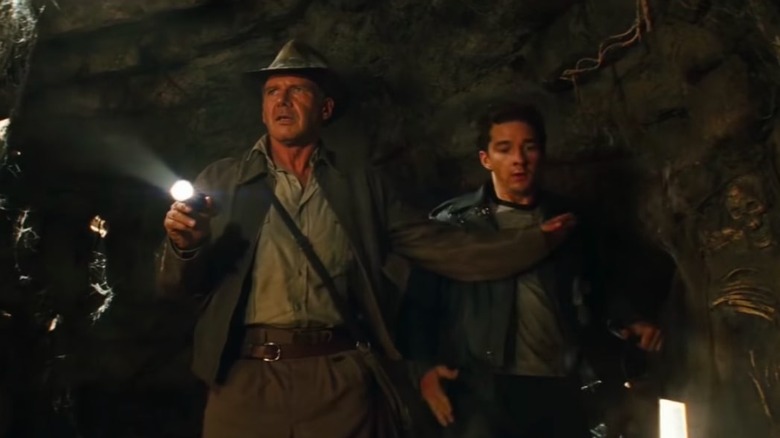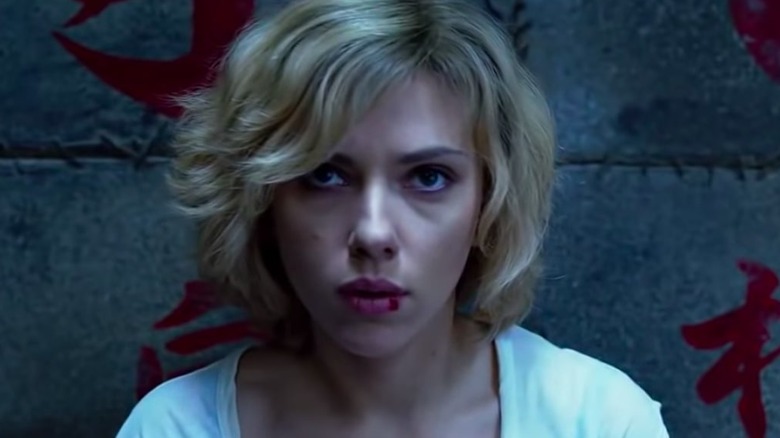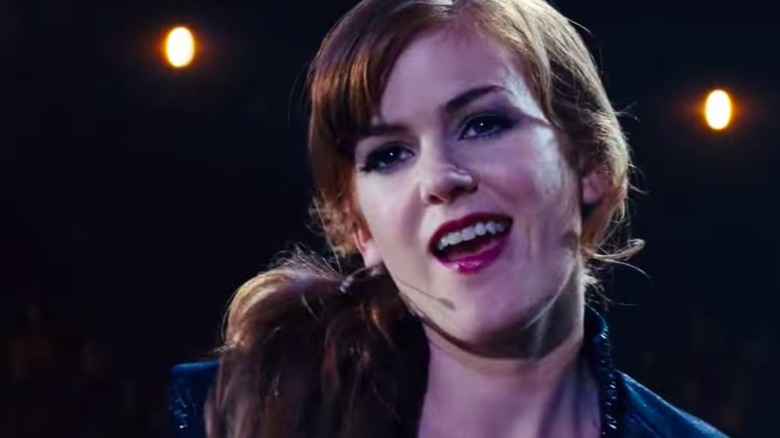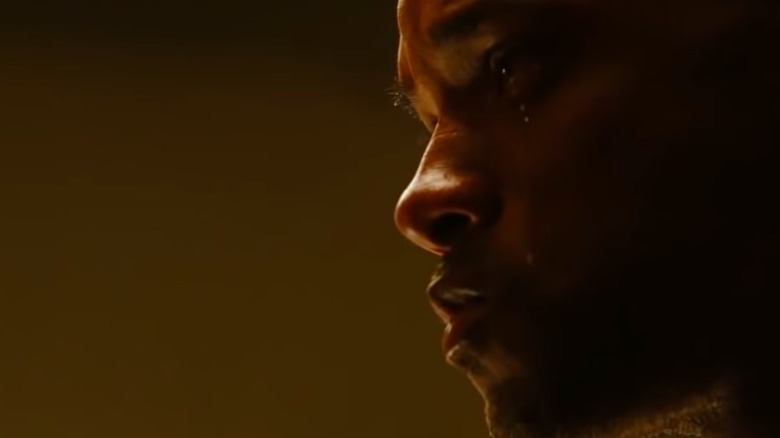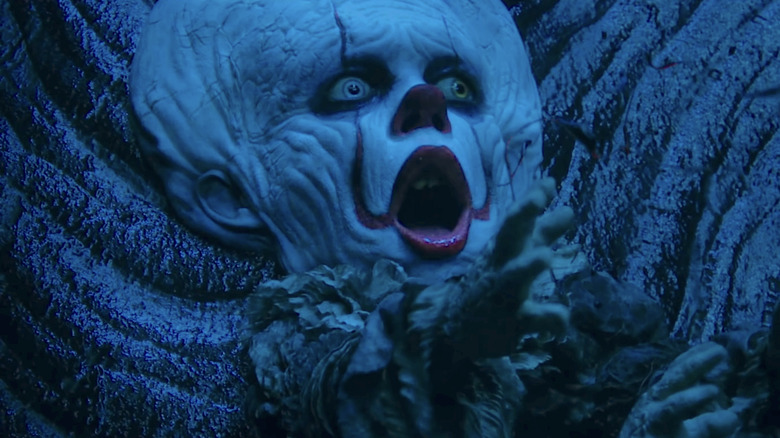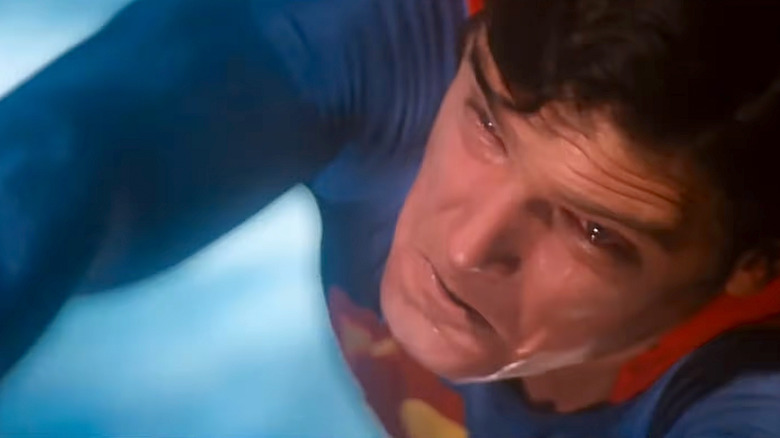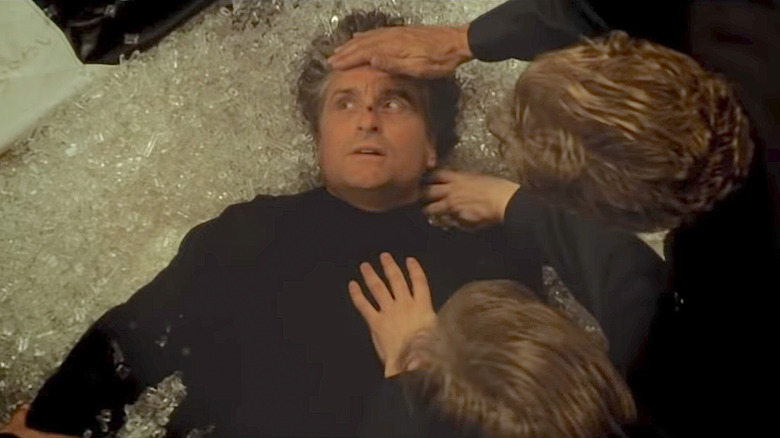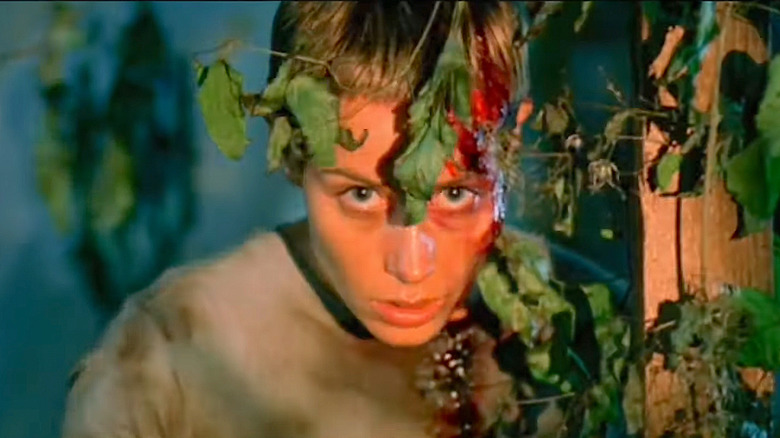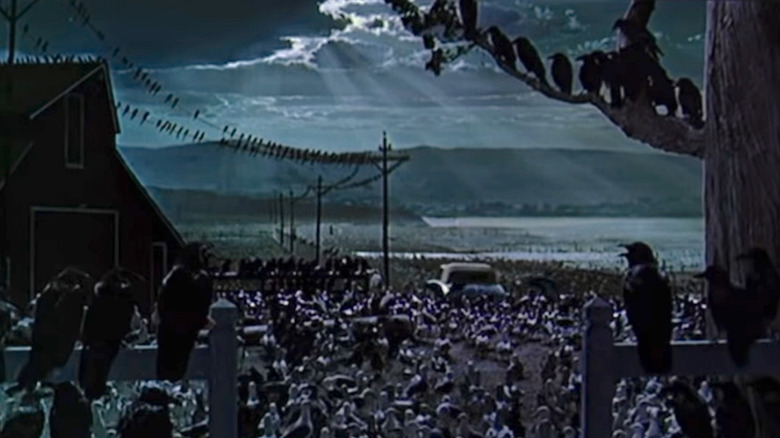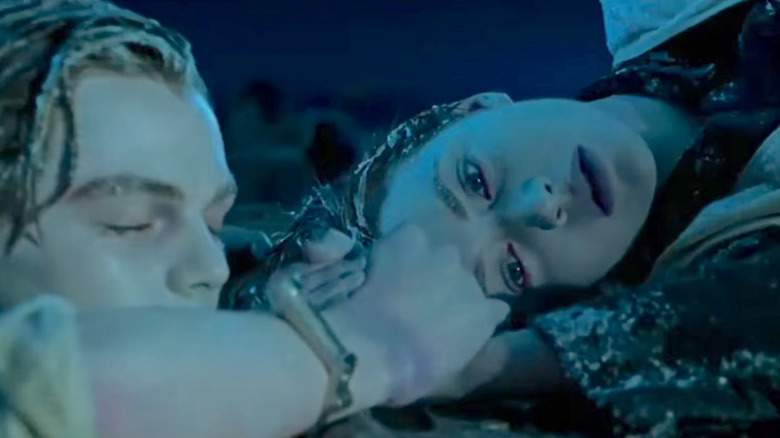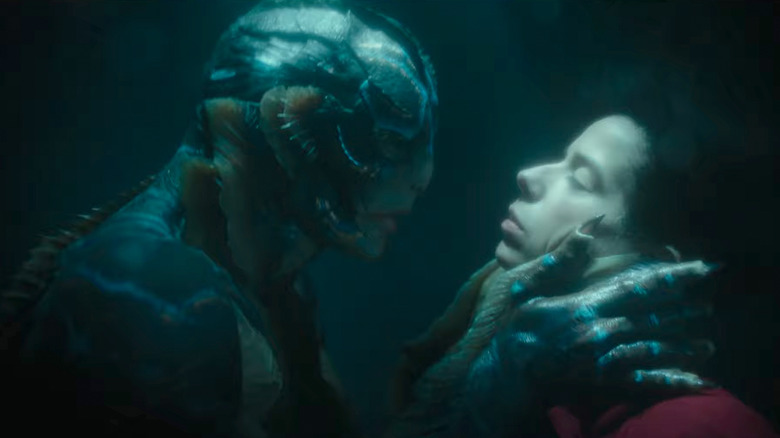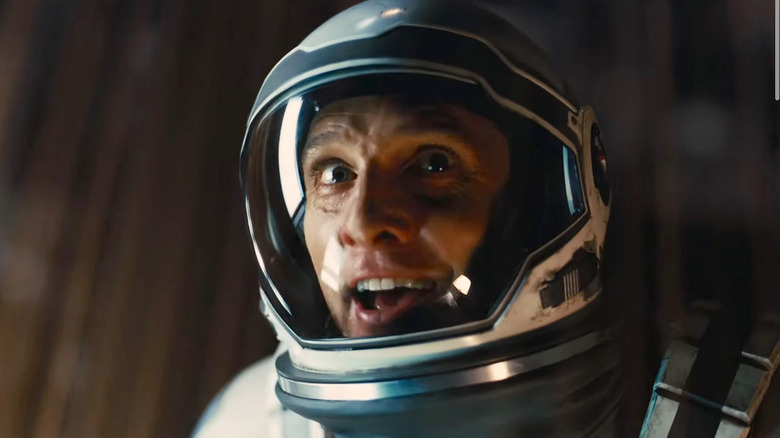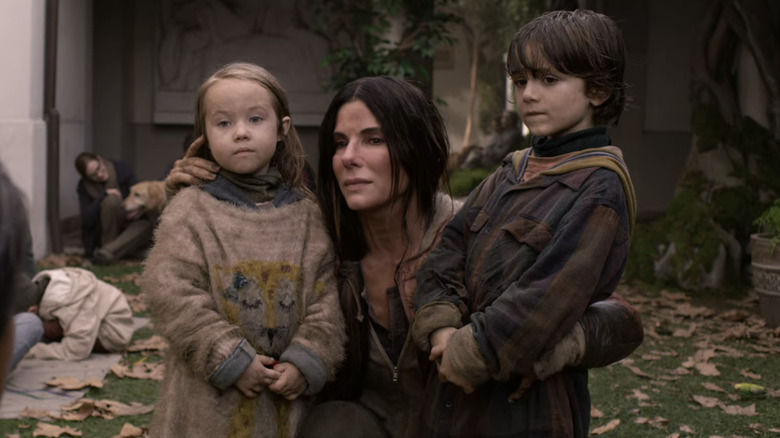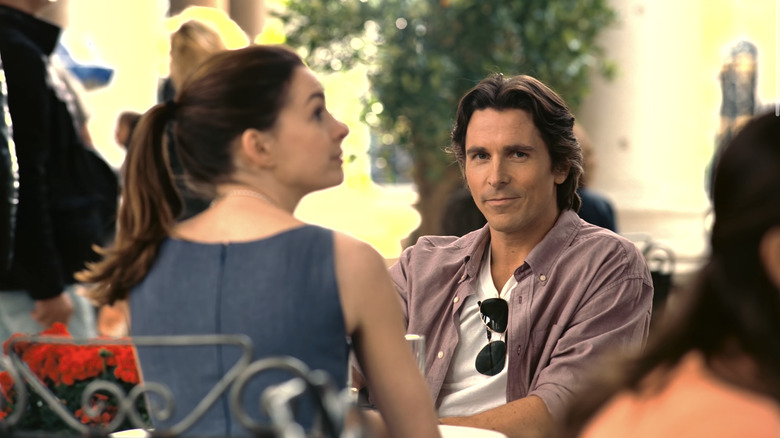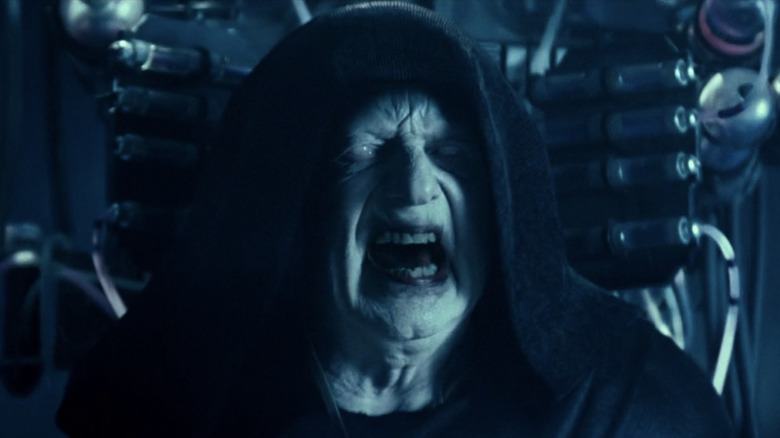Cheap Movie Endings That Upset Audiences
Have you ever watched a film that totally had you hooked from the very first scene, only to lose you in the final moments? As the plot wraps up, you catch yourself wondering where that weird twist came from, or why the entire storyline seems to be unraveling without any hint of real closure. Maybe the movie ends on a cheesy line of dialogue that makes you groan out loud, or maybe the final scenes offer up little more than a totally implausible explanation for the events of the rest the film. Sometimes, a franchise-minded movie raises important questions that are never answered by the sequels. Then there are final installments with lackluster endings — the ultimate disappointment for long time fans.
A mediocre film can occasionally be redeemed by an exceptionally strong conclusion, but on the other hand, an otherwise fantastic film can easily be ruined by a weak ending. We've all wasted a few hours of our lives on movies where it seems like the cast and crew just gave up on the finale. Some may have begun with interesting premises, but unfortunately, their cheap endings left audiences underwhelmed.
The Devil Inside
In the post-"Paranormal Activity" era, it seemed like every horror director was trying to capitalize on the renewed popularity of the found footage genre. But as it tends to happen when studios begin churning out similar films just to keep up with a trend, there were bound to be more than a few duds in this category. One of the most poorly executed found footage movies was director William Brent Bell's 2012 film "The Devil Inside," which follows documentary filmmaker Michael Schaefer and his partner, Isabella, as they team with Father Ben Rawlings to try to determine why her mother murdered three people during an exorcism decades before.
A captivating marketing campaign and genuinely chilling trailer meant that there was strong initial interest in the film, and it topped the box office on its opening weekend. But once word spread about the unsatisfying ending, potential viewers clearly lost motivation to actually see it, and it quickly plummeted down the ranks.
The film could have simply ended on a cliffhanger after the car accident that kills Michael and Ben, with Isabella mysteriously disappearing from the same car after becoming possessed. Instead of allowing audiences to simply imagine the possibilities, viewers were directed to a now-defunct website to look up more information about Isabella's case. Look, nobody goes to the movies expecting a homework assignment. As one Redditor put it, "It ends with buyers remorse."
Knowing
Directors have imagined the end of the world a thousand times over, but audiences keep coming back for more apocalyptic thrillers. A doomsday film done right is always thought-provoking, encouraging viewers to wonder what these visions of the future reveal about the state of humanity today, how we could avoid the same fate as the characters, and how we might spend our own final moments. But an apocalyptic movie that ends on a sour note just feels like a shoddy attempt at indulging in spectacle without offering anything of substance. That's exactly where director Alex Proyas' 2009 film "Knowing" falls flat.
A young boy named Caleb discovers a page full of numbers predicting a major extinction event, and his astrophysicist father, John, determines that an intense solar flare will reach the Earth in mere days, rendering the planet uninhabitable. But just before life on our planet is decimated, a mysterious spaceship descends from the heavens, with four strangers beckoning Caleb and his new friend, Abby, to come with them. The children are whisked away to an Earth-like planet, and the film ends abruptly.
The conclusion raises far more questions than it answers. Did the aliens orchestrate the Earth's destruction? What was so special about Caleb and Abby? Was it a statement about the innocence of childhood? In a Reddit thread gauging disappointment in the film's ending, u/lits opined, "It was trying to be a little too poetic and just fell flat."
Signs
Ever since "The Sixth Sense," it seems like most of director M. Night Shyamalan's signature twist endings have been misses rather than hits. Although "Signs" is generally regarded as a standout entry in his filmography, accepting the ending requires some serious suspension of disbelief for a scientific explanation that just doesn't add up. To be fair, it's a film about an alien invasion, so it's not like every plot point could be 100% plausible, but there's a glaring hole in the reason behind the aliens' demise.
After aliens begin terrorizing the planet and target his family, former minister Graham Hess discovers that simply splashing the aliens with water will cause them to react as though they've been burned, and eventually, it kills them. Radio reports come through to confirm that the aliens are now quickly fleeing the planet as they have realized it's inhospitable for them.
Here's the problem: the Earth is 70% water, and there's plenty of moisture in the air. The aliens would have been exposed to water the moment they exited their ships without suits. One Reddit thread finds a number of users attempting to suss out whether some extra steps — like a theory that the aliens are demons and the water is holy water — might make the ending make sense.
Savages
Based on Don Winslow's novel of the same name, Oliver Stone's 2012 thriller "Savages" basically devolves into little more than worn-out tropes in the final scenes. Wealthy marijuana growers Chon and Ben, who are both in a polyamorous relationship with their girlfriend Ophelia, get caught up with a violent Mexican drug cartel. Ophelia is kidnapped and held against her will to prevent Chon and Ben from backing out of the partnership. As the conflicts escalate, all of the high-stakes drama culminates in a gunfight. Ben is fatally wounded, and Chon administers a lethal injection to Ben, Ophelia, and himself so that they can all die together.
But moments later, the film takes a very different turn. Ophelia wakes up, very much alive, revealing that the previous scene was nothing but a nightmare, and DEA agents end up capturing some of the high-ranking members of the cartel. Chon, Ben, and Ophelia escape to an undisclosed tropical island, where they live in a hut on the beach. Ophelia muses that the three of them might be living like savages.
So, it turns out that the stakes were pretty low for the protagonists all along. One Reddit thread found viewers agreeing that the ending was an "awful cop-out" with "the worst voice-over this side of Blade Runner."
War of the Worlds
H.G. Wells' science fiction novel "War of the Worlds" has spawned several adaptations. Most famously, it was the basis for a 1938 radio broadcast narrated by Orson Welles, which was so convincing that it caused a panic and left people gazing up at the sky, wondering if aliens had really touched down on Earth.
Steven Spielberg's 2005 film adaptation of "War of the Worlds" follows Ray Ferrier, a dockworker in New York who is estranged from his daughter Rachel and son Robbie. He ends up watching them while his ex-wife goes out of town to visit her parents in Boston. After a series of lightning strikes disrupt the power grid, Ray goes outside to see what's going on. To the horror of the gathered crowd, some sort of war machine rises from the ground and begins vaporizing people, causing mass destruction. It becomes clear that an alien species is behind the attack, sending Ray on a mission to protect his children and reunite them with their mother. In the end, the entire family miraculously survives and they find each other in Boston, while the aliens are killed off by the microbes that cover every surface on Earth.
As it turns out, even Spielberg agrees with fans who think the movie wraps up a little too easily. As Yahoo! reports, the legendary director is quoted in the book "James Cameron's Story of Science Fiction" as saying, "That film doesn't have a good ending. I never could figure out how to end that darn thing."
10 Cloverfield Lane
Despite an ending that feels disjointed and incomplete, "10 Cloverfield Lane" is worth a watch — the pacing never lets you take a breath as director Dan Trachtenberg maintains an unrelenting, uncomfortably tense atmosphere all the way through.
After Michelle is knocked out in a car accident, she wakes up in a strange underground bunker with two men she's never met. Howard, the owner of the bunker, tells her that an event has occurred on the surface that has poisoned the air, but she'll be safe in this place. As time goes on, Michelle realizes that Howard is dangerous, and if she wants a chance of surviving, she'll have to take her chances above ground. She manages to escape by killing Howard, and when she finally emerges from the bunker, she has to fight off an alien life form. She drives away from Howard's farm and heads towards Houston upon hearing on the radio that volunteers with combat or medical experience (both things she's accrued over the course of the story) are needed there to fight the invasion.
It's an interesting plot structure, echoing the film's tagline, "Monsters come in many forms." But we barely see the extraterrestrial monsters. If you're wondering how many fans took issue with this, just see the bustling Reddit thread simply titled "The ending to 10 Cloverfield Lane nearly ruined the movie."
Indiana Jones and the Kingdom of the Crystal Skull
The "Indiana Jones" franchise has captivated audiences for decades. It began in 1981 with "Raiders of the Lost Ark," with "Indiana Jones and the Temple of Doom" and "Indiana Jones and the Last Crusade" completing the trilogy before the decade was over. Nearly 20 years passed without another sequel, until "Indiana Jones and the Kingdom of the Crystal Skull" premiered in 2008 ... with an ending so nonsensical that it seemed like a disservice to the franchise.
The film basically wraps up by waving away the entire plot with a simple, overdone explanation: aliens. In fact, it feels like the last few scenes were inspired by episodes of "Ancient Aliens." And to top it all off, the final moments essentially just show Indy returning to normal life — after seeing a spaceship rise from underneath an ancient city and then watching some of his colleagues get sucked into a vortex, never to return. Indy witnessed some pretty wild supernatural happenings in his first three adventures, but somehow this sci-fi twist feels like something else entirely.
The fan community's negative reaction to "Crystal Skulls" is well documented at this point. Even when someone tries to be positive, as u/GrimReaperAngelof23 did with their Reddit thread "Indiana Jones and the Kingdom of the Crystal Skull does not deserve all of the hate it gets," they're sure to get plenty of pushback. As u/Memnoch79 replied, "Your [sic] right. It deserved more. Absolutely hated the ending."
Lucy
Just like the 2011 film "Limitless," the plot of the science fiction movie "Lucy" relies on the premise that human beings only use 10% of our brains. This oft-repeated "fact" is actually just a myth, but even if you accept it as truth solely for the runtime of the film, it still doesn't lead to a solid conclusion. The titular protagonist is kidnapped by drug mules and ends up ingesting an illicit substance that gives her the ability to use more and more of her brain as time goes on. This gives her superhuman powers, like telepathy, telekinesis, and the inability to feel pain.
In the final moments of the film, she finally uses her cognitive power to full capacity, and she journeys back in time through the cosmos to the moment of the Big Bang. Her physical body disappears, yet she is able to send a text to a police captain she had been working with that simply states, "I am everywhere." Her disembodied voice is then heard saying, "Life was given to us a billion years ago. Now you know what to do with it."
Talk about vague — it's unclear as to why anyone thought that this film would be best wrapped up with an ambiguous, bite-sized nugget of philosophy from Lucy. Plenty of movie fans were turned off, including Redditor Dreadnaught Hamster, who laid out their points in a post simply titled "Why I believe Lucy has one of the worst endings of all time."
Now You See Me
Have you ever seen a magician in action who was so skilled at sleight of hand that for just a moment, you were convinced that magic was real? That's basically the idea behind "Now You See Me," kicked up a few notches. The film follows a group of four highly talented illusionists called the Horsemen, who perform a signature, mind-blowing trick: they extract money from wealthy people's bank accounts and give it to the audience members. Naturally, the authorities become suspicious of their activities, and FBI agent Dylan Rhodes begins investigating them.
By the end of the film, it's revealed that Rhodes himself is actually an illusionist, too, and he's been working behind the scenes as the fifth Horseman the whole time. He was avenging his father's death by stealing from the people responsible. But is it a just a heist film? Nope — turns out that magic is real, too, and the Horsemen are all invited to join a secret society called the Eye. It's confounding enough that a vast majority of posts in the official r/Movies "Now You See Me" discussion thread, a vast majority of the replies address issues with the ending. With so little clarity over what's real and what's, well, merely an illusion, it's no wonder that audiences left theaters feeling confused.
I Am Legend
Based on the novel of the same name by Richard Matheson, the post-apocalyptic film "I Am Legend" follows U.S. Army virologist Robert Neville as he struggles to survive each day in the aftermath of a global pandemic in an eerily empty New York City. The majority of the remaining "survivors" of the lethal viral outbreak have mutated into zombie-like creatures, known as the Darkseekers due to their high sensitivity to sunlight. He spends the majority of his time trying to find a cure for the virus, eventually capturing a female Darkseeker to experiment on. After three years with only his German Shephard for company, Neville finally meets two fellow survivors: a woman named Anna and her son, Ethan. Shortly after, the results of his experiments on the captive Darkseeker lead him to a cure.
When the Darkseekers come after Neville for revenge, he's forced to sacrifice himself to save Anna and Ethan, who protect the cure and escape to a survivors' camp. But the ending of the director's cut follows the theme of the novel more closely, and it completely flips the perspective of the film. In that version, Neville actually interacts with the alpha male of the Darkseekers, and returns the women he captured without finding a cure. They share a moment of mutual respect, and Neville realizes that to the Darkseekers, he has actually been the monster all along.
Though the theatrical cut is not without its defenders, a look at the Reddit thread "I Am Legend – Which ending do you prefer?" will reveal that the only opinion more popular than preferring the director's cut is that the ending of Matheson's book wipes the floor with both.
It Chapter Two
The two-part movie adaptation of Steven King's 1986 bestseller "It" did an admirable job bringing the source material to life and condensing it into just two cinematic servings, especially given the novel's 1,138-page length. Unfortunately, part of the condensation process means crafting an ending that ties up all the movie's many (many) themes and storylines, and according to a lot of viewers, the ties the filmmakers used are pretty cheap.
Specifically, a lot of fans objected to the way in which main antagonist Pennywise is finally defeated: by being bullied and abused into shriveling up and dissolving. That felt unfitting to many, especially given the clown's supposed ancient, cosmic power. Plus, the two films had up to that point featured a strong anti-bullying message. As Reddit user tk_woods put it simply, "Worst Villain death EVER. They literally just insulted pennywise to death. Or, as user Jdmcdona wrote with a bit more detail, "What was supposed to be a full on apocalyptic disaster during a psychic staring contest flying through space locked face to face with an immortal eldritch spider terror became... laughing at a clown. Again."
Even after what many consider the laughable, nonsensical confrontation with Pennywise, the subsequent emotional wrap-up didn't fare any better to some. User Jordan311R called it "laughably bad and corny," while user vaporwav3r called it "overly hokey and sentimental." Regardless of their wording, neither felt it particularly earned or effective.
Superman
The 1978 big-screen adaptation of "Superman" starring Christopher Reeve is, without a doubt, a classic and a major landmark in the history of superhero movies. The Richard Donner-directed movie was one of the first to approach its source material with both ambition and seriousness, resulting in a sincere and reverent adaptation and opening the door for other filmmakers to do the same. Donner and Reeve together infused the Man of Steel with humor and humanity, and told the type of story that Superman fans (and superhero fans in general) had waited decades for. For all the many assets held by "Superman," however, it also comes with one massive liability to many fans: its infamously cheap time-reversing ending.
Like some of the other "oops, never mind!" endings mentioned elsewhere, "Superman" features an otherwise complete finale to the film's events, only to quickly rewind and replace the entire sequence — one the worst moves a film can make, in the eyes of many. One Reddit user (whose name we can't write here) summed the problem up well, writing, "The entire third act with Superman being unable to catch the missiles, but at the same time being fast enough to time-travel, always bothered me. It's such a cop-out of an ending."
The Game
The ending of the 1997 thriller "The Game" is an odd case. Since its release, fans and critics have voiced opposite opinions about its effectiveness, with one side calling it unsatisfying and invalidating, and the other side maintaining that the invalidation is the whole point. Yet whether or not the ending is just the intended final turn in the game, it's almost impossible to deny that it's cheap.
The plot of "The Game" revolves around Nicholas (Michael Douglas) becoming embroiled in a series of increasingly bizarre and existentially confusing circumstances. They ultimately include Nicholas getting buried alive and even shooting his own brother, so when it's revealed that everything was staged, no one was actually hurt, and nothing happened as Nicholas thought it did, a lot of viewers have been left feeling cheated.
When it comes to the ending of "The Game," it's not even necessary to search comment threads to find its detractors — they will find you. Many entire threads are devoted to venting over the ending, like the Reddit threads "David Fincher's The Game, a movie-ruining ending?" from Boss452, "The Game (1997)... what was the point?" from LifesAMitch, "The Game (1997) – The hell was that ?" from KunkyFong_, and the most direct of them all: "The ending of The Game (1997) is mind-blowingly stupid." from IngramsCeiling.
High Tension
The 2003 French horror film "High Tension" (or, in its native French, "Haute Tension") really seems like the type of story in which the writer conceived of the twist first and subsequently slapped together a series of events in order to make that twist happen. As a result, its ending has become one of the most commonly cited in online discussions of bad endings, even frequently proclaimed as one of the worst twists and worst overall endings of all time.
In short, the dramatic twist at the end of "High Tension" is that the film's slasher killer was secretly one of the movie's two apparent protagonists — a twist that certainly could work to tremendous effect if it wasn't tacked onto a movie in which such a turn is blatantly impossible. This sloppy reveal that one character was somehow in multiple places at once on multiple occasions doesn't sit well with fans, many of whom have expressed as much in a myriad of colorful ways.
Reddit user ScorpionTDC didn't hold back, writing, "The ending single-handedly ruins the movie ... the twist is a complete cheat with no foreshadowing and no set-up that makes little sense in the context of the film. Just horrendously bad writing." Likewise, user Najfore spawned dozens of upset responses when they asked, "High Tension ending. WTF?"
The Birds
Alfred Hitchcock's "The Birds" — like the vast majority of Hitchcock's films — is an excellent piece of cinema with an enduring legacy and pervasive influence. It introduced mainstream audiences to an entirely new brand of horror, one that generates effectiveness by remaining vague throughout and never explaining itself. A major component of that haunting ambiguity is the film's ending, which consists of a mere fade to black after the main characters drive away. Though the birds have ceased their assault for the moment, there is no answer as to whether or not they'll begin again, only heightening the terror. While the ending is an effective one, it's also undoubtedly a cheap one — especially given the fact that the original script included an answer and resolution, which Hitchcock simply cut and faded to black.
As Reddit user re5re5 put it, "Here's the thing, the ending of 'The Birds' was not satisfying. I wanted to know more about the cause of this [sic] 'attacks.'" Backing them up is a post by user transtwin, prompting Redditors with the thread "Great movies completely ruined by a bad ending?" User IrishFlukey named "The Birds" and had plenty of backup, like damienkarras1973, who added, "that movie had the strangest NON ending I've ever seen its like you think the movie is going to continue and then the credits roll and you're like what the hell was that? that's the end?? are you kidding me?"
Titanic
It's no secret that the ending to James Cameron's 1997 historical epic "Titanic" has been met with an ocean of deep, dark, frigid criticism since its release. What may surprise you, however, is that two entirely separate sequences in the finale have generated mass derision, and both for their own unique approach of cheapness. Of course, the infamous door scene leading to the death of Jack has inspired an endless amount of scrutiny, but so has the emotional wrap-up sequence in the modern day, which ends with an elderly Rose dying and meeting Jack in Heaven — not her decades-long husband and father of her children.
A thread by user Solo-den titled "The Titanic movie ending was pretty weird to me" summed up many criticisms well, elaborating, "So After Jack died Rose later married someone else. She spent her life with him but still ended up with Jack in the afterlife. Imagine being with somebody that loves you (did she love him back? Idk), having kids with them, spending the rest of your life with them, but still end up with someone else in the afterlife."
Then there's the door scene, which posited that only one person could survive the frigid Atlantic waters by floating on Rose's door, hence Jack's death. The disdain for that scene's cop-out nature was so widespread for so long that in 2022, Cameron himself revealed he had funded a scientific study with a hypothermia expert, in order to "drive a stake through its heart once and for all," as he told Variety.
The Shape of Water
Let us make something perfectly clear first: Guillermo del Toro's 2017 fantasy romance "The Shape of Water" is an excellent movie, whose awards, critical ratings, and fan support speak for themselves. There is simply no deriding the film as a whole, but that doesn't mean that every one of its parts is untouchable. Of course, the part we're referring to is the ending, specifically the final few moments in which heroine Elisa seemingly dies, only to be magically resurrected and granted gills by the Amphibian Man. For many, this sudden and unprecedented use of a drama-neutralizing superpower to undo previous story beats felt like a cop-out.
On her blog, Del Toro fan Pallavi Dandamudi opined. "[Since] the amphibian man was able to use his powers to give her gills, it reduces the impact of choices these characters have made. The pain of separation, the fear of losing each other, the willingness to hold on, all of it becomes meaningless ... a Dues [sic] Ex Machina ending." Over on Reddit, user southpawbarry created a post entitled "The Shape of Water – Using the most contrived plot device out there?" and elaborated (seemingly without any time to pause), "The subtle as a sledgehammer nod to self-healing with no explanation as to why in the middle of the movie comes back to save them at the end. Unoriginal, clichéd and contrived."
Interstellar
In his arduous preparations for "Interstellar," Christopher Nolan went to great lengths to ensure the movie's scientific accuracy. The director worked with Nobel laureate in Physics Kip Thorne, whose influence on the project extended from its initial conception all the way through writing and digital effects. The end result is a film deeply rooted in the known behaviors of stars, gravity, black holes, and relativity — until, that is, its surreal ending, a sequence that many fans consider frustrating and cheap.
Much like "The Game," the many detractors of the "Interstellar" ending are easy to find. Just peruse r/movies or even the film's own Subreddit, r/interstellar, and you'll find no shortage of posts and comments lamenting its ending. They range from the angry but open-minded "Can someone explain just how in the hell the ending of Interstellar actually worked?" from user dafones, to the tentatively melancholy "I'm fairly certain the ending of Interstellar ruined the entire movie for me :/" from user DatDude2012, all the way to the no-nonsense "Did anyone else find the 3rd act/ending totally ridiculous?" from user flashnash. Voicing a concern that so many fans have of cheap movie endings, user TheKakistocrat also posted, perhaps rhetorically, "Would Interstellar have been a better movie without the Third Act?"
Bird Box
Netflix's 2018 horror "Bird Box" was released to an exceptionally odd response from fans and critics. On the one hand, it was a streaming sensation, becoming Netflix's most-watched movie within a month of release, and lighting up the cultural conversation for a brief period. On the other hand, even at the peak of its popularity, you would be hard-pressed to find many critics or even fans who praised the movie's overall quality. Common targets of criticism include the skeletal screenplay, expository dialogue, heavy (and unfavorable) comparison to "A Quiet Place," and of course, its cheap, clichéd ending.
There are multiple aspects of the ending that fans find grating, including the non-reveal that Malorie is the children's mother, the silly riverboat climax, and the cloying use of a school for the blind as the ultimate safe haven. In trying to encapsulate their aversion to the ending and its many flawed sequences succinctly, Reddit users have come up with a multitude of different adjectives. There's "rushed, cheesy and embarrassing" from blackwaltz9, "condescending and lazy" and a "hack job" from Red_Whites, and "most predictable thing ever" from mosha24. Perhaps most direct of all was KingPin300-1976, who called it "pure bulls***."
The Dark Knight Rises
One of the most disappointing, frustrating types of cheap movie endings is when a film decides to end without addressing a main theme that it's spent ample time setting up. It's even worse when that theme was built up over multiple films — a trilogy, for instance. It's worse still when the ending directly contradicts the main theme instead of simply ignoring it. Unfortunately for many fans of Christopher Nolan's "Dark Knight" trilogy, in their eyes, that worst-case scenario is exactly what they got when "The Dark Knight Rises" ended with a cheap, miraculous survival on the part of Bruce Wayne. Just as bad to some, the hasty, tacked-on reveal that John Blake is actually named Robin felt needless and pandering.
When Reddit user Envii02 asked "Anyone else have a problem with the ending?" they were met with a solid round of agreement, and likewise, in countless threads simply titled "The Dark Knight Rises Ending" or some variation, the same sentiments echo again and again. Users like Envii02 themselves, shy247er, and shenroon called it a "cop-out." Users like Bassookajoe, Scottama, and BAGStudios called it "cheap." Perhaps the most common descriptor of all comes from users like Arizona_Lemon_Tea, SambaLando, CaptJackSkellington, and a veritable army of others, who above all couldn't buy the "illogical" ending.
Star Wars: The Rise of Skywalker
In all fairness to the cast and crew of "Star Wars: The Rise of Skywalker," there is no single ending that could please every one of the franchise's many millions (and likely billions) of fans. Even with that in mind, however, it's hard to call the ending the filmmakers ultimately chose anything but cheap.
For a great many fans, the ending of "The Rise of Skywalker" was the worst part of a trilogy that had already featured several objectionable sequences. But unlike the trilogy's other alleged faults, which most often offended by ignoring characters and canon from days of "Star Wars" past, the finale committed an even worse, and even cheaper sin: It blatantly erased the overarching story of its own trilogy. There are too many offenses to list, but taken all together, it felt to many fans that the ending was simply a cheap, rushed choice to drum up nostalgia instead of suitably investing in the fates of new characters and concepts.
Naturally, "Star Wars" fans had plenty to say about the unsatisfying ending, exemplified in threads like "Rewatched The Rise of Skywalker. The ending makes absolutely no sense. This is how you end the saga?" by bulletproof5fdp, and one deleted user's thread, titled "The ending of Rise of Skywalker literally killed Star Wars."
